

Like many Americans, you may have been let go. You have a few weeks – or maybe no weeks – to prepare for your next job. On your way out, your employer asks if you want to sign a severance agreement. Some agreements offer a few months of salary. Some offer a few weeks.
You may think that you should sign it and take the money. But that might not actually be the best solution.
You should consider not signing a severance agreement, if:
Refusing the first offer does not mean that you cannot negotiate for better terms.
At The Lacy Employment Law Firm, we can help you negotiate and receive a favorable severance agreement after upon exiting your company. We can also advise on whether you should accept severance at all.
At its core, severance agreements are contracts. Most people know what a contract is. It’s an agreement where two parties are bound to do something. And it’s only binding if a party gets something for signing on the dotted line.
This “something” is known as “consideration” in the legal world.
When most people think of contract law, they think of executives making deals. Or perhaps sports players signing huge multi-million dollar contracts.
What most people do not realize is that most people actually deal with contracts quite regularly.
When you sign up for your cell phone service, you are signing a contract. You obligate yourself to pay the bill. And your phone provider obligates itself to provide you service.
You could probably think of numerous scenarios in which you signed a contract. If you downloaded a video game, you have to sign the user agreement before playing. Here’s Ebay’s:
If you venture to Ebay’s website, you will notice that the actual agreement is incredibly long. And that it is broken into 19 different subparts. That’s a lot of reading.
Although user agreement contracts have been scrutinized for varying legal reasons, they are contracts that we sign often. Some of us, every day. And most of the time, we do not read them.
When you think about contract law, you should think about creating laws. When you enter into a contract, you have created law between you and another entity/person. Those words you agreed upon are legally binding.
And, if you breach (break) the contract, your employer can sue you.
This is why having a lawyer guide you through signing the severance process is important. You will create better law if you have a lawyer helping you out.
The purpose of a severance agreement is to spell out the terms upon which you will leave a company.
Employers usually offer severance because they want you to sign a release. A release is an agreement to waive liability. This means that the employer is paying you not to sue.
From the employer’s perspective, the severance agreement provides a sense of finality as well. The employer has an incentive to know that your departure will not be met with any resistance.
Both parties, essentially, are contracting for a clean break.
From your perspective, you’ll get money while you find a new job. Perhaps it’s most important to you to have some income for a period of time.
Maybe you believe that your firing was justified. Or at least nondiscriminatory.
In the United Statements, employment is at will. You can be a great employee. But your employer can still fire you for any non-illegal reason. That is, that the employer did not violate one of the many civil rights statutes.
You might make a determination with your lawyer that a potential employment law claim would not prevail.
Or, even if you did face discrimination, you might decide that the suit is not worth it. In employment law cases, your primary source of damages is back pay. Back pay is the amount of money that you would have earned had you not been fired.
If you are an in-demand worker, you might count on obtaining new employment soon. If you do, that would seriously hurt the damages component of a potential employment lawsuit.
Further, you might also consider your reputation. In some industries, suing your employer could impede your career progress. This is especially true in high-level corporate positions. In these positions, it tends to be a small world.
People within the industry often talk. And you might become known as the person who sued your employer.
This is not always the case, however. I would also note that this fear is more perception than reality.
Both sides sometimes have an interest in coming to a separation agreement. But these agreements usually favor the employer.
Employers will have lawyers draft their agreements. And an employee may agree to it without even reading it.
It’s smart for you to have a lawyer advising you on these issues.
You should seriously consider signing a settlement agreement with a lawyer before you do. Waiving the right to sue is something you should think through.
If you belong to a protected group, you should give this extra thought:
These are just a few of the groups that can file discrimination lawsuits. If you are a member of any of these groups, you are part of a protected class.
Although employment is at will, discrimination against members of any of these groups is against the law. And there are certain ways in which the law provides protection.
If you are a member of a protected class, pay attention. A lawyer should talk you through your severance pack anyway. But you can take a hard look with your lawyer at whether your employer illegally fired you.
In addition, you want to consider the value of any potential case. Your damages, as mentioned, are primarily measured by backpay.
But if your employer’s termination was particularly egregious, you might be entitled to other damages.
Although many people thing race or sexual harassment with respect to severance agreements, employers pay severance when faced with an age discrimination claim.
An employer may offer to pay severance simply to avoid an employee over 40 suing. Employees are often unaware of their protections against age discrimination.
Employers offer severance packages to avoid paying claims of which most employees are unaware.
On the other hand, you should also consider if you want to sue. Employment cases take a while. You have to first file a “charge” with the Equal Employment Opportunity Commission (“EEOC”). Or you can file a charge with a state agency.
Either way, an administrative agency will first hear your claim.
After you file a charge with the EEOC, the EEOC will investigate. This usually takes about six months. After the EEOC investigates.
After the EEOC investigates, it will almost certainly give you a right to sue. Although the EEOC will sometimes take your case itself, that does not usually happen.
Then, after the EEOC investigation, your employment lawyer can file suit on your behalf. Your lawsuit can take anywhere from three months to two years. Maybe shorter, maybe longer.
It would also say that your case could settle during the EEOC investigation or go all the way to trial. It depends.
But you most likely will not settle before filing suit in federal court, and it usually takes six months to get there.
You should consider whether you want to wait this long. If you’re doing it for the money, it may take a while to get paid. If you’re doing it on principle, you are still in for a long fight.
I do not say this to discourage you to sue. You will likely get far more compensation through a lawsuit. You also will have the chance to stand up to your company where many people roll over and take severance.
Even if you are inclined to take severance, perhaps think about the terms. Through the severance agreement, you are entitled to severance pay. This is usually negotiable.
It helps to have an attorney here. But if you go it alone, make sure that you understand your value.
I would advise starting high. This is called anchoring. Even if the employer comes back with a number you do not like, you have more wiggle room. And there’s some psychology behind why asking for a high number leads to a better result.
Pay is likely the most important consideration. But there are others, including:
You should think about these and other terms while negotiating your severance package.
In the end, whether you should sign a severance agreement depends on whether you are willing to forgo the right to sue, whether you are happy with your severance pay, and whether you can iron out the terms and conditions of your severance agreement with your company.
You can still sue if you signed a severance agreement. It is just harder to win your case. You will first have to prove that the release you signed is invalid.
A release is a provision promising not to sue. When you sign it for a severance agreement, you agree to waive a host of claims. Employment laws protect against claims ranging from race to wage and hour violations.
Courts generally do not like severance agreements. So, it might be worth trying to prove that the release you signed is invalid.
To prove waiver, a court will likely consider:
You will that these factors protect mostly uneducated people without an attorney. For example, the court would be much more likely to waive a release for a factory worker than a COO.
After reading these factors you might think that you should not get an attorney during severance negotiations. These factors do weigh in your favor if you are unrepresented. And if you are not a high-level employee.
This strategy is likely a bad one. First, you might sign an agreement, have a great employment claim, and then have a court uphold the agreement.
Nothing is a slam dunk with judges. Or you could get a bad severance deal, not have a good legal claim, and still be stuck.
You should negotiate a severance agreement like it’s the last money you will get from your company. And have the agreement serve it’s purpose. You and your company both get to move on.
Lastly, one final note. You cannot contract away certain federal rights. If you faced discrimination, you can still file a charge with the EEOC. Filing a charge is considered protected activity.
Your company cannot bar you from engaging in protected activity. You should note, however, that just because you can file a charge does not mean you get money.
Although you have a right to file a charge, that does not mean that you can recover money damages. Your release likely waived that right. And courts have found waivers of claims for money damages permissible.
Sometimes employees feel lucky to receive severance agreements. But, actually, the employers receive the benefit. To make sure that they don’t, remember:
If you need advice, we are here to help. We can consult with you before you sign. We can also help you out after. What will you do before signing a severance agreement?
The Lacy Employment Law Firm
Ⓒ 2022 All Rights Are Reserved